Iranian Olympic uniform mocked, compared to medical scrubs
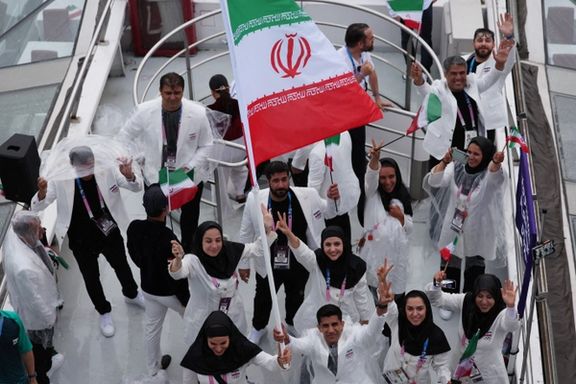
Amid the 2024 Olympic Games progress in Paris, Iranian athletes are battling not only their opponents but also a storm of mockery stirred by their uniforms likened to medical scrubs.

Amid the 2024 Olympic Games progress in Paris, Iranian athletes are battling not only their opponents but also a storm of mockery stirred by their uniforms likened to medical scrubs.
The delegation was wearing white jackets with black clothing, the women all with compulsory hijabs with film and television actor Behrang Alavi posting on Instagram: "Wishing success for the injections team."
Public figures and media outlets have not held back in their criticism.
State TV host Elmira Sharifimoghaddam said on air, "The Iranian team looked as if a team of doctors and nurses had gone to Paris."
The moderate-conservative website, Asr-e Iran, highlighted the consistently poor choice of attire for the delegations as they travel to the Games over the years, controversy around uniforms nothing new for Iran.
"Since the London 2012 Olympics, Rio de Janeiro 2016, Tokyo 2021, and now in Paris, the issue of strange, bizarre, and ugly clothing designs has been a consistent source of embarrassment," they wrote.
"It is astonishing that the Ministry of Sports and the National Olympic Committee have not been able to provide an elegant and dignified outfit for the Iranian team for the Paris Olympics in the past three years."

Adding fuel to the fire, there was no official unveiling ceremony for the uniforms before the team's departure, a shift from tradition likely intended to avoid immediate backlash.
The Ministry of Sports and the National Olympic Committee have faced intense scrutiny, with many questioning the transparency and rationale behind their choices.
Asieh Amini, a social issues analyst, told Iran International that in 2021, 31 billion rials (over $160,000 at the time) were allocated for athletes' clothing, “but this year, we don't even know how much has been spent", she said, as the country faces its worst ever economic crisis.
She added, "These uniforms have no connection to a country with various ethnic groups and their beautiful traditional clothes. How is it possible that, with all our ethnicities, traditions, and high potential, what we show to the world is so tasteless?”
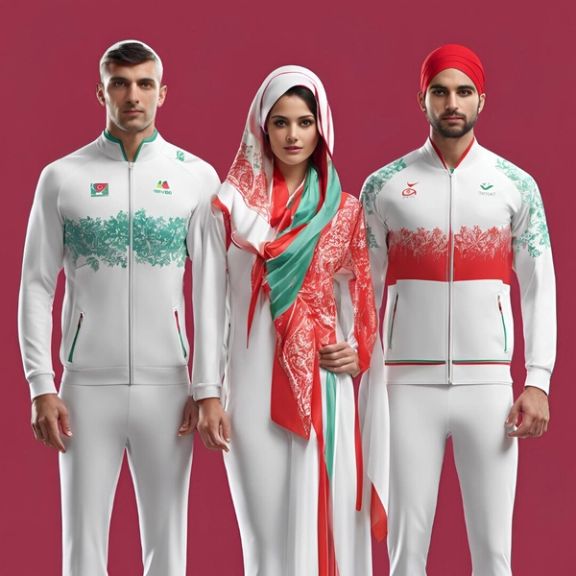
Asr-e Iran's review added, "The Olympics is the most important sporting event for all athletes worldwide. With these ugly outfits, we completely destroy our athletes' morale and confidence from the opening day, and then we expect them to bring home the best medals."
Some have also shared AI-generated photos depicting how the Iran team uniforms might have looked if designed by AI.
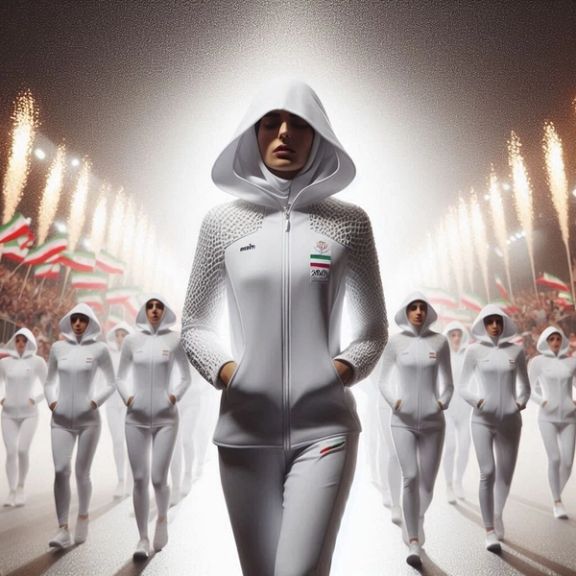
Mahsa Javar, a national rowing athlete and brand ambassador for the Iranian sports delegation's clothing, defended the designs in a controversial social media post, calling the critics "uncultured."
Her comments only intensified the backlash, with many advising her to focus on her performance rather than engage in the controversy. However, she later apologized for her comments, stating that the athletes, like others, are not happy with the uniform.
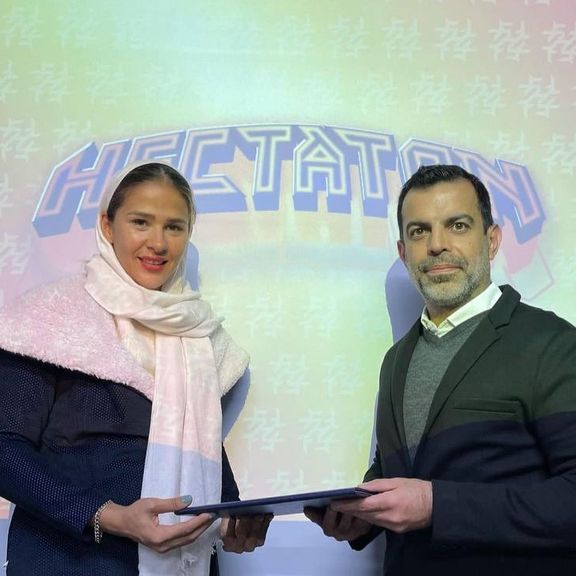
The 2016 Rio Olympics saw a major uproar over the bizarre design and color choices, leading to a complete redesign. The 2020 Tokyo Olympics followed a similar pattern, with athletes wearing turquoise blue attire and white masks, which were widely criticized, none of which bore the colors of Iran's national flag.
Prominent sports website Varzesh-3 vented frustration saying the opportunity on the Olympics' "grand stage" has been missed, once again. "Most other countries use this opportunity to showcase the most beautiful aspects of their culture and civilization. We, however, consistently fail to present a respectable image," she said.
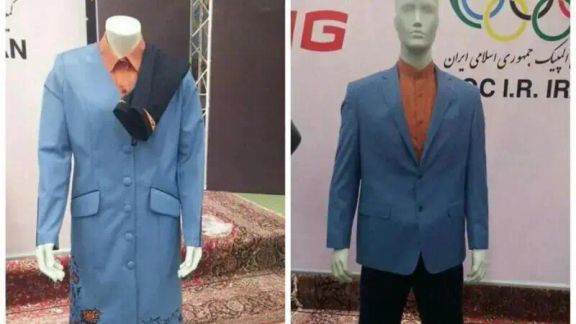
Allegations of cronyism have also surfaced. Mojtaba Pourbakhsh, a former TV host, revealed that the design contract initially awarded to the Majid brand or Merooj Inc. was abruptly handed over to the Hectaton brand, owned by Ali Aajdarkosh.
The Majid brand is owned by the Abdolmajid Saedifar family. They operate under a company named Majid Merooj Iranians, which was established in 2010. The quality of the national football, wrestling, and volleyball team uniforms designed by the company has faced criticism in recent years.
The Hectaton brand is also owned by a company named Pishgaman Danily Aras. This company was established in 2012 and, like Majid Merooj Iranians, is family-operated under the ownership of Ali Ajdarkosh.
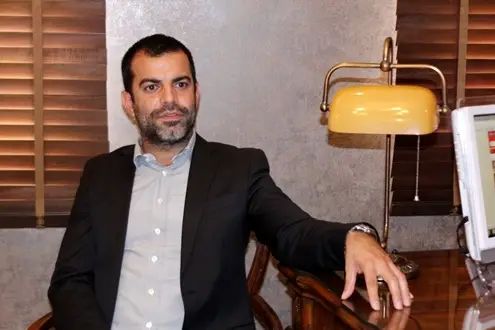
Ajdarkosh's close ties with sports officials and athletes, along with his sponsorship of various events, have raised questions about the integrity of the selection process.
According to Pourbakhsh, the National Olympic Committee, whose secretary has been Manaf Hashemi since 2022, initially signed a multi-billion contract with the Majid brand for the design and production of the uniforms. However, the project was later handed over to the Ajdarkosh family.
Another official responsible for selecting the Iranian team's outfits for the Olympics is Mahmoud Khosravi Vafa. Khosravi Vafa has been the President of the National Olympic Committee since September 2022. In 1980 and 1981, he served as a bodyguard for Ali Khamenei, the Supreme Leader of the Islamic Republic, for a short period.
Rouydad 24 reported that the Iranian government's direct intervention and preference for close associates in selecting the clothing designer bypassed usual formalities, leading to the current debacle.
"This time, everything happened behind the scenes," said Majid Nami, a member of the Clothing Union. "The result is a disgraceful representation of our culture and heritage."
“Cronyism and connections are two factors that prevent transparency in the procurement of uniforms for national and Olympic teams. If high-level decision-making and the Iranian government were free from cronyism and connections, there would be no other reason to obscure this process," said Amini in her interview with Iran International.
She also called the industry a "mafia", saying, "When you have this mafia behind all your operations and decisions, it is definitely necessary to be transparent. But to avoid accountability, you are forced to conceal everything and keep it shrouded in ambiguity. And then, when it's all over, they say it's too late to do anything about it,” she said.
“The issue is that this lack of accountability and transparency has become routine in the Islamic Republic. Corruption has essentially become a standard practice among the managers of the Islamic Republic,” she added.